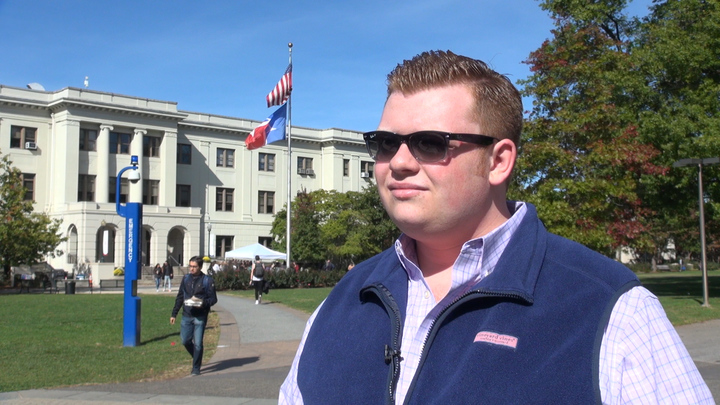DURHAM, N.C. — Every four years, College Republicans around the country rally around the GOP nominee for president. But this year, Donald Trump has turned the tradition into a moment of reckoning, pitting club members against club members and chapters against chapters in ways that mirror the feuding in the Republican Party.
At the top 75 universities with College Republicans chapters, based on U.S. News and World Report’s rankings, 14 chapters have formally endorsed Trump and six more have issued supportive statements; 14 have explicitly declined to endorse him or, endorsed another party’s candidate; and another three have issued statements opposing Trump, according to a survey conducted by Medill News Service.
Thirty-nine College Republican chapters had no statements at all, which actually is more traditional because in the past support for the party’s nominee was a given. Trump’s divisiveness has caused clubs nationwide to weigh in. The first was the Harvard Republican Club in early August, which declared it would not be supporting the GOP nominee for the first time in 128 years.

At least one school — University of Virginia — rescinded its explicit endorsement after the tape of Trump making lewd comments was released and a surge of Republicans called on him to drop out. However, Republicans at Emory College in Atlanta endorsed Trump a few weeks after the tape’s release, and Southern Methodist University just decided Oct. 26 to endorse the GOP nominee.
For Frank Pray, former chairman of the University of North Carolina College Republicans, being conservative on a predominantly liberal college campus has always been difficult. But Trump has made it more challenging.
Pray, a UNC senior, said his car was vandalized earlier this year and he has received multiple death threats via text message.
“People have lost their ability to have rational discussion without resorting to ad hominem attacks or personal character judgments,” said the Charlotte, N.C., native. “With the Trump phenomenon, there is sort of a tendency to push people to act like that because the nominee himself is acting like that.”
But the long-term effects of Trump’s candidacy are what worry some young conservatives who say he is hurting the party’s efforts to bring in Millennials.
According to a new USA TODAY/Rock the Vote Millennial poll, young voters have overwhelmingly rejected Trump. The poll released Sunday shows Hillary Clinton leads Trump by 41 percentage points among voters 18-34.
Clinton’s massive lead over Trump narrows a bit among Millennials in new poll
Adam Lemon, former chair of College Republicans at Duke University, said years of effort reaching young people have been reversed with Trump at the top of the GOP ticket.
“One of my big goals has been to bring more Republicans out of the woodwork,” he said. “We have done a decent job of that thus far and I think this election has set us back a good bit.”
He hopes, in the future, young voters don’t confuse Trumpism with traditional conservatism, which he argues are two very different ideologies but have been conflated this election.
Part of Trump’s struggles with attracting young voters is that his core issues of opposing free trade and severely limiting immigration don’t appeal to college students. Polling indicates most millennials care most about issues that directly affect them: getting jobs, college affordability and global warming.
While groups around the country have struggled with how to respond to their party’s nominee for the presidency, few have gone as far as the Cornell College Republicans. It was the only one of the top 75 colleges to back Libertarian Party candidate Gary Johnson. In response, the New York Federation of College Republicans revoked recognition of the Cornell chapter but reinstated it after being threatened with a lawsuit, according to Club President Olivia Corn.
State federations of College Republican chapters have divided in their approaches. The North Carolina Federation of College Republicans showed no hesitation in supporting the Republican candidate, according to chapter members from different schools in the state. But the Georgia Association of College Republicans released a statement that it will “not bind our chapters to promote Donald Trump’s candidacy for president.”
The day after the tape of Trump apparently bragging about sexual assault on a bus was made public, Alex Smith, national chairman of the College Republican National Committee, tweeted: “The Party of Lincoln is not a locker room, and there is no place for people who think it is. Definitely not with her, but not with him.”



